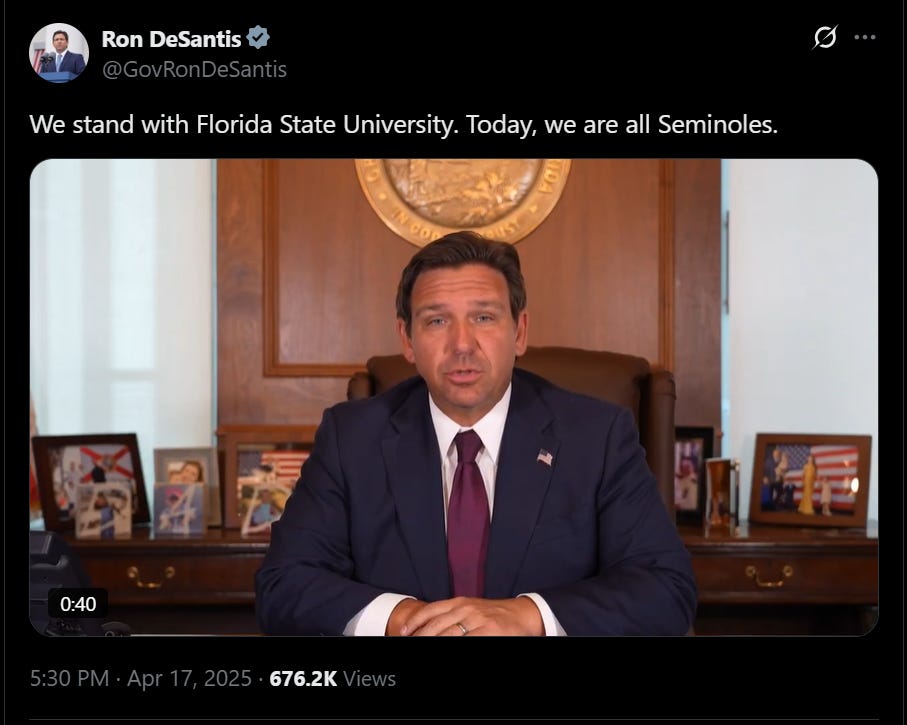The FSU shooting and the death penalty
Here's what to expect related to the death penalty and the expected prosecution of the FSU shooter.
On Thursday, tragedy struck the Florida State University community as an active shooter opened fire at the Student Union—the heart of FSU’s main campus in Tallahassee—around lunchtime. Two (Tiru Chabba and Robert Morales) were killed in the shooting, and several others (including the shooter) were injured.
First and foremost, as a member of the FSU community (an undergrad alumna, a law school alumna, and an adjunct professor), my heart goes out to the entire FSU family, especially those who were affected by this horrible act of violence.
The purpose of this post is to inform those following this case of the discussion surrounding the death penalty related to this case and information on the capital sentencing process.
Politicians Speak Out
In the wake of the shooting, Gov. DeSantis vowed that the shooter “must and will be brought to justice in the fullest extent of the law.”
Other politicians took to social media to tout Florida’s capital punishment legislation. Sen. Blaise Ingoglia tweeted Thursday afternoon that incidents like the one at FSU are why he “authored and sponsored” the 2023 legislation that reduced the jury vote requirement to impose a sentence of death:
Rep. Berny Jacques spoke on Florida’s Voice in support of Florida’s 2023 legislative change, which he sponsored in the House:
The outcome of the trial for the Parkland shooter (also in Florida) was the impetus for the 2023 legislation, which went info effect April 20, 2023. You can read more about this legislation from TFDP here.
What to Expect Next
Prosecutors will charge the shooter with all charges deemed appropriate, which will likely include two counts of first-degree murder—one for each of the victims who were killed in the shooting. Prosecutors then have the discretion whether to seek the death penalty on each count. Under section 782.04, Florida Statutes (2024), prosecutors have “45 days after arraignment” to notify the defense that they intend to seek the death penalty.
If prosecutors do not seek the death penalty, then the shooter would be automatically sentenced to life in prison without parole (LWOP) if convicted of first-degree murder. If prosecutors do seek the death penalty, then the trial (if the case proceeds to trial) would proceed in two phases, unless a determination is made before trial that the shooter, for some reason, is ineligible for the death penalty as a matter of law. In the guilt phase, the jury determines whether to convict the defendant on each charged offense. Any guilty verdict must be unanimous under the Sixth Amendment. After a conviction of first-degree murder on a count on which the State seeks the death penalty, the case proceeds to the penalty phase, where the jury considers aggravating and mitigating evidence and then makes a sentencing recommendation. Under Florida’s current capital sentencing scheme (section 921.141, Fla. Stat. (2024)), the jury’s recommendation for death must only be 8-4. Then the trial court makes the final sentencing determination.
Related Legislation
Pending legislation that would add an aggravating factor for crimes that occur at a gathering “for a school activity” could be at issue in this case if it passes this session. You can read more about this legislation from TFDP here. You can access more information on the Senate’s website here.







Thank you for sharing this.
Phil:
The way most statutes are written, the guilty/not guilty phase is a fact issue, requiring a unanimous vote, but the sanction issue is much more of an opinion issue. The states that still require a unanimous sanction vote for the death penalty allow 1 vote (8%) to overrule 11 votes (92%), to get life, not death, likely the most undemocratic vote in a democratic republic.
Thank DeSantis for being more democratic, even though 5 against death still overcomes the 7.
Of the 24 studies, finding for death penalty/execution deterrence, since 1996, the most deterred was 5%, not 100%. The 5% is about 900 innocents spared, per year.
In addition, I think most school shooters are aware there is a good chance they may be killed by law enforcement, so execution deterrence doesn't mean much, if anything., to them.